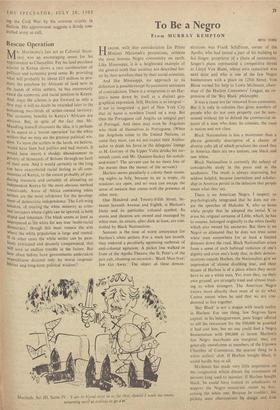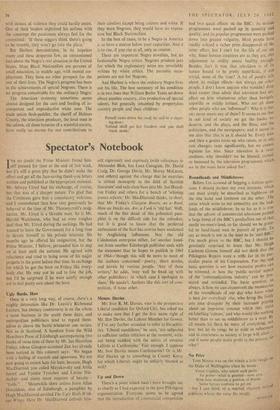To Be a Negro
From MURRAY KEMPTON
NEW YORK
HARLEM, with due consideration for Prime Minister Nkrumah's pretensions, remains the most famous Negro community on earth. Like Mississippi, it is a heightened example of the general truth that societies are described bet- ter by their novelists than by their social scientists.
And like Mississippi, no approach to its definition is possible except by successive sentences of contradiction. There is a temptation to set Har- lem's name down by itself as a distinct geo- graphical expression. Still, Harlem is so integral— if not so integrated—a part of New York City that its name is nowhere found on a map. But then the Portuguese call Angola an integral part of Portugal. And there may even be Angolans who think of themselves as Portuguese. (When the Angolans come to the United Nations, as come they must, can we not expect their Ambas- sador to drink his Jerez in the delegates' lounge as M. Guirma of the Upper Volta drinks his ver- mouth cassis and Mr. Quaison-Sackey his scotch- and-water? The servant can be no more free of the master than the master of the servant.) Harlem seems peculiarly a. colony these steam- ing nights in July, because its air is tropic, its windows are open, and no man can escape the sense of menace that comes with the presence of other men.
One Hundred and Twenty-Fifth Street, be- tween Seventh Avenue and Eighth, is Harlem's focus and its particular colonial symbol. Its stores and theatres are owned and managed by white men; its streets, after dark at least, are con- trolled by Black Nationalist's.
Summer is the time of worst annoyance for Harlem's white settlers. For a week last month, they endured a peculiarly agonising outbreak of anti-colonial agitation. A picket line walked in front of the Apollo Theatre, the St. Peter's of the jazz cult, chanting on occasion : 'Black Man Stay; Jew Go Away.' The object of these demon-
Macbeth. Act III, Scene IV : am in blood stept in so far that, should I wade no more, returning werP as tedious as go o'er.'
strations was Frank Schiffman, owner of the Apollo, who had rented a part of his building to Sol Singer, proprietor of a chain of restaurants.
Singer's plans represented a competitive threat to Lloyd Von Blane, whose own restaurant was next door and who is one of the few Negro businessmen with a place on 125th Street. Von Blane turned for help to Lewis Micheaux, chair- man of the Harlem Consumers' League, an ex- pression of the 'Buy Black' philosophy.
It was a cause not far removed from commerce. But it is only in colonies that great numbers of people who do not own property can be sum- moned without fee to defend the commercial in- terest of a man who does. In colonies, the issue is nation and not class.
Black Nationalism is less a movement than a phrase generally descriptive of a cluster of diverse cults all of which proclaim the creed that in America there are two nations, one black and one white.
Black Nationalism is currently the subject of considerable study in the press and in the academies. The result is always interesting but seldom helpful, because journalism and scholar- ship in America persist in the delusion that people mean what they say.
There is no American Negro, I suspect, so psychologically integrated that he does not en- joy the speeches of Malcolm X, who so hates white people that he adopted the initial X to erase his original surname of Little, which, he has to assume, belonged originally to the white family which also owned his ancestors. But there is no Negro so alienated that he does not trust some white man somewhere for at least a limited distance down the road. Black Nationalism arises from a sense of such habitual violation of one's dignity and even one's body that, in their demon- strations outside Harlem, the Nationalists give an impression of almost disabling fear, and their dream of Harlem is of a place where they never have to see a white man. Yet, even they, on their own ground, are strangely kind and almost trust- ing to white strangers. The American Negro knows more directly than most of us do what Camus meant when he said that we are con- demned to live together.
`Buy Black' is not a slogan with much reality in Harlem. For one thing, few Negroes have capital; in his beleaguerment, poor Singer offered to sell his restaurant for the $90,000 he asserted it had cost him, but no one could find a Negro businessman with $90,000 to invest. Harlem's few Negro merchants are marginal; they are generally unwelcome as members of the Uptown Chamber of Commerce, the nearest thing to a white settlers' club. If Harlem bought black, it could hardly buy at all.
Micheaux has made very little impression on the resignation which dilutes the resentment of persons long used to injustice. If Harlem bought black, he could have trusted its inhabitants to support the Negro restaurant owner by boy- cotting the white one. Because he couldn't. his pickets were obstreperous by design and free with threats of violence they could hardly mean. One of their leaders explained his actions with the contempt the passionate always feel for the committed: 'If these niggers think there's going to be trouble, they won't go into the place.'
But Harlem demonstrates, in its hopeless many and these desperate few, an unmentioned fact about the Negro's real situation in the United States. Most Black Nationalists are persons of small education, in middle age, with menial em- ployment. They have no other prospect for the rest of their lives. The Negro's progress has been in the achievements of special Negroes. There is no progress conceivable for the ordinary. Negro.
The American economy sometimes seems almost designed for the care and feeding of in- competent and unproductive white men. The trade union flesh-peddler, the sheriff of Holmes County, the television producer, the loud man in the saloon, all those luxuries of a wasteful society, have really no excuse for our contributions to their comfort except being citizens and white. If they were Negroes, they would have no expres- sion but Black NationaliSm.
In the best of cases, to be a Negro in America is to have a station below your capacities. And it is to rise, if you rise at all, only as creator.
There are important Negro novelists, but no fashionable Negro critics. Negroes produce jazz for which the explanatory notes arc invariably written by white critics. The parasitic occu- pations are not for Negroes_ And Harlem is where the ordinary Negro lives out his life. The best summary of his condition is in two lines that William Butler Yeats set down about another country, also productive of special talents, but generally inhabited by propertyless country people and their children:
Parnell came down the road, he said to a cheer- ing man : 'Ireland shall get her freedom and you shall break stone.'



































 Previous page
Previous page